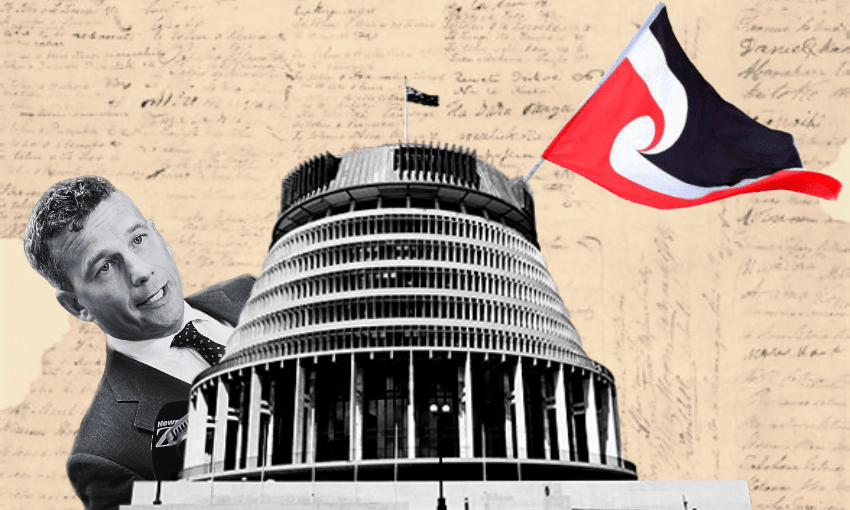The Treaty principles bill will officially go no further – within this parliament, at least. Lyric Waiwiri-Smith reports from the House of Representatives.
Eleven in favour, 112 opposed: that was the count that officially killed the Treaty principles bill on Thursday afternoon, after nearly two years of “will they, won’t they” eroding Māori-Crown relations. The bill leaves parliament, but its ghost will still haunt, levitating over the Act Party offices and waking us up in the night with the reminder that we let a single minority party suck up a lot of oxygen – not to mention time and money – with a divisive piece of legislation that was never going to get anywhere.
The vote reflected the amount of support – or lack thereof – the bill had garnered through its history-making select committee process: 307,000 written submissions boiling down to 8% in support and 90% opposed, according to the justice committee’s report. That support sits 2% under the threshold needed to call a citizen’s referendum via petition.
A niggly voice must have been at the backs of the minds of opposition parliamentarians and Toitū te Tiriti supporters in the public gallery as the votes were called, the part of the brain that handcuffs us to imaging the worst-case scenario. What if the ad nauseam promises from the prime minister that the bill would be voted down were all lies? What if we woke up to an Aotearoa where our founding document had been redefined?
It didn’t happen. In the end, the Act Party’s MPs walked silently out of the House of Representatives after the vote with their tails between their legs and yellow binders in their arms, each receiving a faux-apologetic pat on the back from Te Pāti Māori’s Tākuta Ferris. There was applause, but it wasn’t for them – the MPs had lifted their hands skywards to the public gallery, acknowledging the people power which can empower or bury political movements.
The second reading had opened with the bill’s architect, Act leader David Seymour, who had just begun speaking when a member of the gallery attempted a haka. Speaker Gerry Brownlee had choice words for the disruption upstairs: “We live in a democracy – this is the place where opinions are given, not the gallery.” It’s true, but phrases like that lend weight to a common public belief that the people are never really heard. The member of the gallery was removed by security.
Seymour told the House the nation’s history curriculum had taught us that “history is a simple story of victims and heroes separated by their ancestry”. The idea that someone’s race matters reflected “old-fashioned primitive determinism”, he said, and this bill had revealed the “sizeable minority” who seemingly don’t care for equal rights or liberal democracy.
View this post on Instagram
He ended his speech by quoting Karl Popper’s The Open Society and Its Enemies, written in New Zealand: “The more we try to return to the heroic age of tribalism, the more surely do we arrive at the inquisition, the secret police, and a romanticised gangsterism.” It was hard for the public gallery to hear: they “ugh”ed, rolled their eyes or else wiped tears.
Labour leader Chris Hipkins stood next to label the legislation a “grubby little bill” born from a “grubby little deal”. It will forever be a stain on the country, he said, but he was heartened that a bill “based on mythology” had been met with scorn from hundreds of thousands.
“No victory, no virtue and no principles – they get no credit for finally starting to fight the fire they helped to ignite,” Hipkins said. “They will forever be on the wrong side of history with this bill … they led nothing, they stopped nothing, and they stood for nothing.” When Seymour tried to heckle, he was shushed by Labour’s Willow-Jean Prime.
The Greens’ co-leader Marama Davidson followed to speak to the “miserable little” bill for the first time – she’d been away undergoing breast cancer treatment when it had its first reading – and spent much of her speech praising the bill’s opponents, those who could “sniff the division from a mile away”. How could it be that Māori supposedly have better protections than their Pākehā counterparts if they’re three times more likely to be convicted of a cannabis-related crime?
“I challenge [Act] to release their myth of special Māori treatment,” Davidson said. “I implore them, so they do not bring any more embarrassing bills like this to the House.”
Treaty negotiations minister Paul Goldsmith rose for National, telling the House the bill was a “crude way to handle a sensitive topic” and “it was clear from the beginning this bill was not going to pass”. To say he wasn’t the man the people wanted to hear from would be an understatement: prime minister Christopher Luxon was in Wellington on Thursday morning, but by the time the bill’s second reading began, he was in Auckland. His government decides the order of the day, and yet they couldn’t work past a scheduling conflict. Even Māori development minister Tama Potaka was missing from the lineup – so far down the food chain, he wasn’t given a speaking spot despite requesting one.
“Coalitions require compromise,” Goldsmith said. “None of us got what we wanted. That is life under MMP.” Life under MMP has been pretty bumpy for National so far – if the party’s bad luck in partnership continues, it might learn what was truly compromised at the voting booths next year.
Other senior members of government were also missing from the mix, including NZ First leader and deputy prime minister Winston Peters. His colleague Casey Costello apologised for his absence – he was boarding a plane, too. The half-empty seats on the government side must have reflected a few full planes.
So instead, Costello spoke for the other third of the coalition. “We cannot allow the Treaty to be weaponised, and we cannot allow it to take a place that will forever position us as New Zealanders in conflict with each other as a result,” she said. “That is the very antithesis of what was intended by the bill.”
Te Pāti Māori’s Hana-Rawhiti Maipi-Clarke opened her speech by recognising the Māori trailblazers who had died during the bill’s progression: Kiingi Tuheitia, Tā Bom Gillies and Dame Tariana Turia, to name a few. “The real problem is that this institution, this House, has only recognised one partner, one culture, and one language from one Treaty,” she said. “That is the real privilege.”
She was close to tears as she paid tribute to the bill’s opponents. “We had two choices: to live or to die,” she said. “We chose to live – ka ora tonu tātou ake ake ake.”
View this post on Instagram
“Shame!” was the call that echoed around the House from the Greens’ Tamatha Paul. Energised, she embodied the sentiment from her allies in Te Pāti Māori that the day was a celebration, not a burial. “There is more than one way to skin a cat, and more than one way to kill a bill,” Paul grinned. She shared a whakataukī from her Ngāti Awa tupuna: “Waiho mā te whakamā e patu – let shame be their punishment.”
“Attacks on indigenous people everywhere are happening right now,” Paul said. “They may have deep pockets, but we have the people power, and we will not be quiet.”
Former justice committee chair James Meager spoke next on the submission process, as did his colleague and committee member Rima Nakhle, as well as Labour’s Duncan Webb, the committee co-chair. While Meager and Nakhle applauded the success of the select committee process, Webb labelled it “shabby”.
“And I see David Seymour’s already on Twitter saying that he still doesn’t have a good reason for why this bill is being turned around,” Webb quipped.
“Trying giving us one,” Seymour shot back.
“Well, I’ll give you one,” Webb replied, his body heaving with barely concealed rage. “I’ll give you one – it’s a lie!”
His colleague Willie Jackson was even less restrained when talking to the “red neck agenda” he attributed to Act and its “nut-job supporters”. He told the House that at Hinewhare Harawira’s tangi earlier this week, Te Pāti Māori had left a copy of the bill to be buried with the matriarch.
“The Treaty principles bill has highlighted the very worst of our democracy and, at the same time, the very best of our democracy,” Jackson said. “This race-baiting political stunt has been a rightwing obscenity masquerading as equality. You should be ashamed on that side of the House – they should all be ashamed – for allowing this hate into parliament.” He was kicked out for refusing to withdraw and apologise for calling Seymour a liar.
It felt as though the entire House had taken a collective breath before Brownlee announced the outcome of the vote. The room sucked its stomach in, held its breath in suspension over the benches, and finally exhaled a gust of relief to the opposition benches, while blowing the government side out the doors.
The speaker was kind enough to allow the public gallery to sing a waiata – ‘Tūtira Mai Ngā Iwi’ – an allowance for the public to be involved with proceedings usually reserved for the readings of Treaty settlements. When it wrapped, a lone kaumatua attempted a haka aimed at Seymour, only to have Brownlee call for security. But the guard in the gallery didn’t kick the koro out – instead, they shared a forgiving smile.


